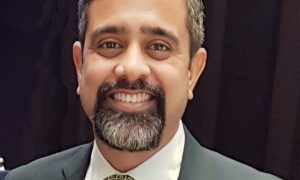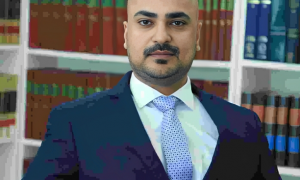This interview has been published by Namrata Singh and The SuperLawyer Team

Your career journey showcases an impressive trajectory in the realm of Intellectual Property Rights. Could you share the pivotal moment or experience that motivated you to pursue this field? Also, when you first started practicing, what were some of the most significant challenges you faced, and how did you overcome them?
Initially with a strong passion for finance, I earned my bachelor’s degree in commerce, however, noticing the importance of Intellectual Property Rights (IPR) I, tilted towards law with clear standing of pursuing career in IPR. My journey to where I am today is a testament to consistency and dedication towards work. In the early days of my career, I was young, enthusiastic, and eager to understand the complexities of law. Finding a mentor was crucial, and I dedicated myself to learning and hard work. Patience and perseverance were my guiding principles until I eventually established my own firm. I’m grateful to all who supported me on this journey.
Your previous associations highlight diverse experiences, from attending hearings to coordinating raids. How have these experiences enriched your understanding of the legal ecosystem?
My past roles, from attending hearings to coordinating raids, have significantly broadened my understanding of the legal world, especially in intellectual property law. At hearings, I learned about courtroom dynamics, legal strategies, and how judges interpret laws. Coordinating raids taught me practical enforcement tactics, gathering evidence, and dealing with challenges in IP protection. These experiences gave me real-world insights into how the law works in practice, essential for effective advocacy and helping clients navigate legal issues.
Apart from legal expertise, what other skills or qualities do you believe are essential for a successful career in Intellectual Property Law?
According to me, effective client relationship management, proper preparation and thorough documentation collection before starting work, creative thinking etc. are essential for a successful career.
Given your extensive experience, you’ve likely encountered various misconceptions about Intellectual Property Rights. What is one common myth or misunderstanding about IP law that you often find yourself dispelling in your practice?
What I have encountered mostly is the basic misconception amongst the client that
“If he makes even a slight change to his commercial benefit and file mere trademark application, it becomes his property.” “Further, registration of trademark is expenses which client wishes to do once they earn good amount of money under that trademark”
Trademark law protects only distinctive words, symbols, logos, signs, names that are capable of distinguishing the goods and services from those of others. Any modified version cannot be granted protection until the same is distinctive.
As a guest faculty at various institutions, you likely interact with aspiring legal professionals. What differences, if any, do you observe between students of today’s generation and those from when you were in their shoes? How do these differences influence your approach to teaching or mentoring young legal minds.
With students increasingly digitally savvy and globally connected, they are more aware of international issues, which shapes our discussions on legal topics with global impact. I integrate real-world examples from around the world to enrich their legal education.
I also stress the values of ethical behaviour, professionalism, consistency, and empathy in legal practice. This instills in students a strong sense of responsibility and integrity as they prepare to enter the legal profession.
As someone who has witnessed the evolution of Intellectual Property Law over the years, what emerging trends or developments do you find particularly intriguing or promising for the future of IP protection and enforcement?
In recent years, I’ve seen a significant shift in intellectual property (IP) towards protecting digital innovation and technology. Advances in AI, blockchain, and biotech have created new challenges and opportunities in IP.
Businesses and consumers are increasingly aware of and enforcing IP rights, especially post-pandemic. This cultural shift is fostering innovation and entrepreneurship, promising a bright future for IP for India’s economic growth and competitiveness on the global stage.
Beyond the courtroom, Intellectual Property disputes can sometimes involve alternative dispute resolution methods like mediation or arbitration. How do you approach these alternative methods, and what unique advantages do they offer in resolving IP conflicts?
Alternative dispute resolution (ADR) provides a special way to settle intellectual property conflicts, standing out from traditional litigation. It offers confidentiality, speed, and cost-effectiveness, making it appealing for resolving disputes amicably while protecting sensitive business details and avoiding long legal battles.
I focus on the client’s business interests and try to create an environment that encourages open communication, emphasizing active listening, strategic negotiation, and exploring creative solutions tailored to the unique complexities of each dispute. These are a few of benefits of mediation.
Beyond legal pursuits, what are your personal hobbies or interests that you find enriching or rejuvenating?
As a legal professional, I strongly advocate for maintaining a balanced lifestyle that includes regular outdoor activities to foster mental and physical well-being. I try to spend quality time with my family and indulging in my hobbies. I particularly enjoy playing table tennis and badminton with my family whenever possible. Additionally, I have a passion for driving.
Internships play a crucial role in shaping the careers of law students. Could you elaborate on the significance of internships in providing practical experience and mentorship opportunities for aspiring legal professionals? Additionally, what advice would you give to law students or young lawyers aspiring to specialize in Intellectual Property Law?
For those looking to specialize in Intellectual Property Law, I would advise seeking internships in Tier 2 or Tier 3 firms, as they offer opportunities to learn about prosecution, opposition, and litigation all at the same time. Typically, internships in Tier 1 firms only provide exposure to either prosecution, opposition, or litigation. It’s also important to maintain a network with professionals, stay updated on industry trends, and take a proactive approach to learning. This field is dynamic and rewards dedication and hands-on experience.
I would like to extend my heartfelt thanks to Team Superlawyer for inviting me and giving me this opportunity.
Get in touch with Vikas Khera-


























